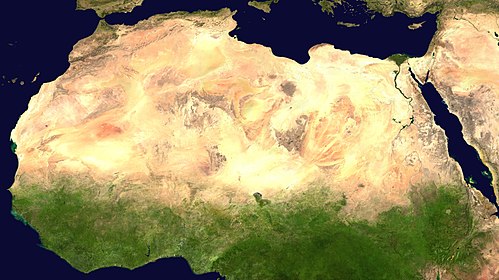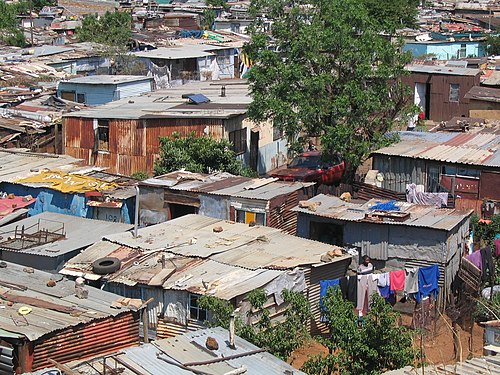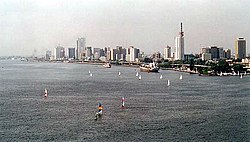Portal:Africa



Africa is the world's second-largest and second-most populous continent after Asia. At about 30.3 million km2 (11.7 million square miles) including adjacent islands, it covers 20% of Earth's land area and 6% of its total surface area. With nearly 1.4 billion people as of 2021, it accounts for about 18% of the world's human population. Africa's population is the youngest among all the continents; the median age in 2012 was 19.7, when the worldwide median age was 30.4. Based on 2024 projections, Africa's population will exceed 3.8 billion people by 2100. Africa is the least wealthy inhabited continent per capita and second-least wealthy by total wealth, ahead of Oceania. Scholars have attributed this to different factors including geography, climate, corruption, colonialism, the Cold War, and neocolonialism. Despite this low concentration of wealth, recent economic expansion and a large and young population make Africa an important economic market in the broader global context, and Africa has a large quantity of natural resources.
Africa is highly biodiverse; it is the continent with the largest number of megafauna species, as it was least affected by the extinction of the Pleistocene megafauna. However, Africa is also heavily affected by a wide range of environmental issues, including desertification, deforestation, water scarcity, and pollution. These entrenched environmental concerns are expected to worsen as climate change impacts Africa. The UN Intergovernmental Panel on Climate Change has identified Africa as the continent most vulnerable to climate change.
The history of Africa is long, complex, and varied, and has often been under-appreciated by the global historical community. In African societies the oral word is revered, and they have generally recorded their history via oral tradition, which has led anthropologists to term them "oral civilisations", contrasted with "literate civilisations" which pride the written word. African culture is rich and diverse both within and between the continent's regions, encompassing art, cuisine, music and dance, religion, and dress.
Africa, particularly Eastern Africa, is widely accepted to be the place of origin of humans and the Hominidae clade, also known as the great apes. The earliest hominids and their ancestors have been dated to around 7 million years ago, and Homo sapiens (modern human) are believed to have originated in Africa 350,000 to 260,000 years ago. In the 4th and 3rd millennia BCE Ancient Egypt, Kerma, Punt, and the Tichitt Tradition emerged in North, East and West Africa, while from 3000 BCE to 500 CE the Bantu expansion swept from modern-day Cameroon through Central, East, and Southern Africa, displacing or absorbing groups such as the Khoisan and Pygmies. Some African empires include Wagadu, Mali, Songhai, Sokoto, Ife, Benin, Asante, the Fatimids, Almoravids, Almohads, Ayyubids, Mamluks, Kongo, Mwene Muji, Luba, Lunda, Kitara, Aksum, Ethiopia, Adal, Ajuran, Kilwa, Sakalava, Imerina, Maravi, Mutapa, Rozvi, Mthwakazi, and Zulu. Despite the predominance of states, many societies were heterarchical and stateless. Slave trades created various diasporas, especially in the Americas. From the late 19th century to early 20th century, driven by the Second Industrial Revolution, most of Africa was rapidly conquered and colonised by European nations, save for Ethiopia and Liberia. European rule had significant impacts on Africa's societies, and colonies were maintained for the purpose of economic exploitation and extraction of natural resources. Most present states emerged from a process of decolonisation following World War II, and established the Organisation of African Unity in 1963, the predecessor to the African Union. The nascent countries decided to keep their colonial borders, with traditional power structures used in governance to varying degrees. (Full article...)
Selected article –
The Kennedy Airlift was started in 1959 by a 28-year-old Kenyan, Tom Mboya, who sought support for promising Kenyan students to get college and university educations in the United States and Canada. It brought hundreds of students from East Africa from 1959 to 1963 and was supported by many North American educational institutions, foundations, and individuals such as the African American Students Foundation (AASF) and African Americans including Harry Belafonte, Jackie Robinson, Sidney Poitier, and Martin Luther King Jr. It got its popular nickname in September 1960 when Senator John F. Kennedy in a close presidential campaign arranged a $100,000 donation from the Joseph P. Kennedy Jr Foundation to cover airfare for the autumn 1960 group of East African students just as the program was running out of funds. (Full article...)
Featured pictures –
Did you know (auto-generated) -

- ... that African-American journalist Erna P. Harris was called a "fearless critic" of the internment of Japanese Americans by the US government during World War II?
- ... that the Indianapolis African-American community raised $100,000 in just ten days in 1911 to establish the Senate Avenue YMCA?
- ... that Gil Scott-Heron's 1975 song "Johannesburg" was banned in South Africa during apartheid?
- ... that Pocatello mayor Les Purce was the first African-American political officeholder in Idaho?
- ... that Ruth L. Bennett provided shelter for more than 2,000 black women and girls who migrated north to Chester, Pennsylvania, as part of the Great Migration?
- ... that Mackay Davashe wrote "Lakutshona Ilanga", the English version of which, sung by Miriam Makeba, became the first South African piece to chart on the Billboard Hot 100?
Categories
Selected biography –
Pieter Kenyon Fleming-Voltelyn van der Byl GLM ID (11 November 1923 – 15 November 1999) was a Rhodesian politician who served as his country's Foreign Minister from 1974 to 1979 as a member of the Rhodesian Front (RF). A close associate of Prime Minister Ian Smith, Van der Byl opposed attempts to compromise with the British government and domestic black nationalist opposition on the issue of majority rule throughout most of his time in government. However, in the late 1970s he supported the moves which led to majority rule and internationally recognised independence for Zimbabwe.
Van der Byl was born and raised in Cape Town, the son of the South African politician P V van der Byl, and served in the Middle East and Europe during the Second World War. After a high-flying international education, he moved to the self-governing British colony of Southern Rhodesia in 1950 to manage family farms. He went into politics in the early 1960s through his involvement with farming trade bodies, and became a government minister responsible for propaganda. One of the leading agitators for Rhodesia's Unilateral Declaration of Independence in 1965, Van der Byl was afterwards responsible for introducing press censorship. He was unsuccessful in his attempt to persuade international opinion to recognise Rhodesia, but was popular among members of his own party. (Full article...)
Selected country –
 |
 |
||

| |||
Nigeria, officially the Federal Republic of Nigeria, is a country in West Africa and the most populous country in Africa. Nigeria shares land borders with the Republic of Benin in the west, Chad and Cameroon in the east, and Niger in the north. Its coast lies on the Gulf of Guinea, part of the Atlantic Ocean, in the south.
Nigeria gained its independence on October 1, 1960, and now consists of 36 states and the federal capital territory. Nigeria re-achieved democracy in 1999, having been ruled from 1966 until 1999 (except for the short-lived second republic) by military dictators.
Nigeria is a federal republic modeled after the United States, with executive power exercised by the president and with overtones of the Westminster System model in the composition and management of the upper and lower houses of the bicameral legislature. Since 1991, its capital has been the centrally-located city of Abuja; previously, the Nigerian government was headquartered in the coastal city Lagos. (Read more...)
Selected city –
Lagos (/ˈleɪɡɒs/ LAY-goss; also US: /ˈlɑːɡoʊs/ LAH-gohss; Yoruba: Èkó), or Lagos City, is a large metropolitan city in southwestern Nigeria. With an upper population estimated above 21 million dwellers, it is the largest city in Nigeria, the most populous urban area on the African continent, and one of the fastest-growing megacities in the world. Lagos was the national capital of Nigeria until the government's December 1991 decision to move their capital to Abuja, in the centre of the country. Lagos is a major African financial centre and is the economic hub of Lagos State and Nigeria at large. The city has a significant influence on commerce, entertainment, technology, education, politics, tourism, art, and fashion in Africa. Lagos is also among the top ten of the world's fastest-growing cities and urban areas. In 2024, Time Out magazine ranked Lagos as the 19th best city to visit in the world. A megacity, it has the second-highest GDP in Africa, and houses one of the largest and busiest seaports on the continent. Due to the large urban population and port traffic volumes, Lagos is classified as a Medium-Port Megacity.
Lagos emerged as a home to the Awori subgroup of the Yoruba of West Africa in the 15th century, which are contained in the present-day Local Government Areas (LGAs) of Lagos Island, Eti-Osa, Amuwo-Odofin and Apapa. Before the 15th century, the Awori settled on a Farmstead along the coastal line in and around which they worked and lived. The Farmstead translates to Ereko in Yoruba, from which comes the Lagos indigenous name "Eko". The lands are separated by creeks, fringing the southwest mouth of Lagos Lagoon, while being protected from the Atlantic Ocean by barrier islands and long sand spits such as Bar Beach, which stretch up to 100 km (62 mi) east and west of the mouth. Due to rapid urbanisation, the city expanded to the west of the lagoon to include areas in the present day Lagos Mainland, Ajeromi-Ifelodun, and Surulere. This led to the classification of Lagos into two main areas: the Island, which was the original city of Lagos, and the Mainland, which it has since expanded into. This city area was governed directly by the Federal Government through the Lagos City Council, until the creation of Lagos State, in 1967, which led to the splitting of Lagos city into the present-day seven Local Government Areas (LGAs), and an addition of other towns (which now make up 13 LGAs) from the then Western Region to form the state. (Full article...)
In the news
- 1 May 2025 –
- The bodies of three South African police officers who had been missing for six days are found in the Hennops River. (BBC News)
- Kenyan parliament member Charles Ong'ondo is shot to death in Nairobi by unknown gunmen on a motorcycle in an apparent assassination. (BBC News)
- 30 April 2025 – Puntland–Somaliland dispute
- Las Anod conflict, Puntland–Somaliland prisoner exchange
- Puntland releases fifteen prisoners of war in exchange for Somaliland releasing eleven combatants captured during the conflict in the contested Sool region. This is the second prisoner exchange of prisoners captured during the conflict in Las Anod. (Hiiraan Online) (Horn Observer)
- 30 April 2025 – Foreign relations of Taiwan, Somaliland–Taiwan relations
- Amid strengthening ties between Taiwan and Somaliland, the Somali government bans Taiwanese passport holders from Somalia, citing UN Resolution 2758 and the One China policy. Taiwan lodges a protest with Somalia and claims China instigated the ban. (BBC News) (Reuters)
- 29 April 2025 – Boko Haram insurgency
- At least 26 people are killed when a truck hits a roadside bomb in Borno State, Nigeria. (Al Jazeera)
Updated: 19:05, 2 May 2025
General images -
Africa topics
More did you know –
- ... that Dutch malacologist Adolph Cornelis van Bruggen is an expert in African land snails?
- ... that a 20‑day study reported by BirdLife International discovered 265 species of birds in Nki National Park?
- ... that Kalulu, an African boy who died in 1877, was modeled in Madame Tussauds and attended Dr. Livingstone's funeral in London?
- ... that Samuel Jackman Prescod became the first person of African descent elected to the Parliament of Barbados?
Related portals
Major Religions in Africa
North Africa
West Africa
Central Africa
East Africa
Southern Africa
Associated Wikimedia
The following Wikimedia Foundation sister projects provide more on this subject:
-
Commons
Free media repository -
Wikibooks
Free textbooks and manuals -
Wikidata
Free knowledge base -
Wikinews
Free-content news -
Wikiquote
Collection of quotations -
Wikisource
Free-content library -
Wikispecies
Directory of species -
Wikiversity
Free learning tools -
Wikivoyage
Free travel guide -
Wiktionary
Dictionary and thesaurus


























































































